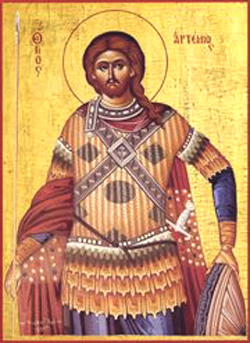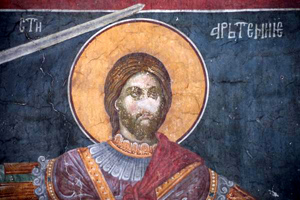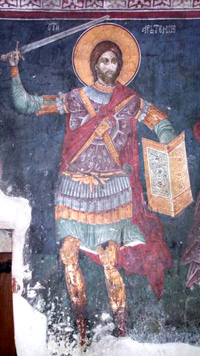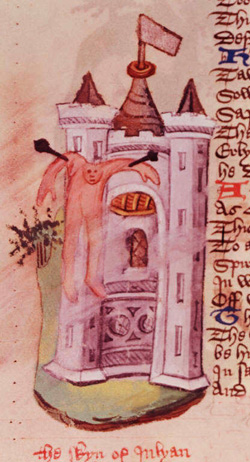 |
The Saint of the Day
St. Artemius – October 20
Prof. Plinio Corrêa de Oliveira
Biographical selection:
Artemius was a commander of the Imperial Army under Constantine. Julian the Apostate - Emperor from 361 to 363 - ordered him beheaded in 363.

St. Artemius
|
Julian the Apostate had raised up a huge persecution against the faithful Catholics. After torturing a great number of the faithful, he condemned the priests Eugene and Macarius. As they were being tortured, an official seated near the Emperor stood up and directed these words to him:
“Why do you so cruelly torture these holy men? Do not forget that you also are a man and that it was God who allowed you to be Emperor. Take care, for Satan, who asked permission to tempt Job, may have requested leave to use you against us in order to sow tare amid the wheat of Christ. But his scheme will be futile because he no longer has the power he had of old. Since Christ came and was raised on the Cross, Satan’s pride and power were defeated. Do not have illusions - O Emperor! - in following your love of Satan, do not persecute the Christians protected by God. The power of Christ is invincible.”
Hearing these words, Julian became indignant and asked who was the insolent wretch who dared to pronounce such bold words. He was told that the man was Artemius of Alexandria, Governor of Egypt and Syria who had just arrived, bringing new troops for the war against Persia. The Emperor ordered him arrested. After St. Artemius endured many torments that aimed to make him apostatize, Julian gave the order for him to be beheaded.
Before the execution, he asked for time to pray. He said:
“O Divine Jesus Christ, have pity on Thy Church. Thy altars will be desecrated, and the Blood of Thy alliance despised because of the blasphemies that Arius has vomited against Thee. He separated Thee, the only Son of God, and the Holy Spirit from the co-substantiality of the Father, proposing that the Father would be different from Thy nature – Thou who are the Author of all creation. He subjected Thee to time – Thou who existed before all centuries.”

A Roman amphitheater in Arles, France gives an idea of the scene of the death of St. Artemius
|
After saying these words he genuflected three times toward the East, and then again prayed aloud:
“God of God, King of Kings, Thou who are seated in Heaven at the right hand of the Father who generated Thou, Thou who are the crown of those who fight for the cause of piety, favorably hear this humble and unworthy servant and receive his soul in peace.”
A voice replied from Heaven saying that his prayer had been heard, and that the Emperor would die in Persia, be succeeded by a Christian, and idolatry would be irremediably destroyed.
After hearing these words, Artemius serenely laid down his head for the sword.
Comments of Prof. Plinio:
Considering the grandeur of St. Artemius, one becomes sad to live in the 20th century where governors and presidents are so trifling and mediocre.

St. Artemius as a militant soldier defending the honor of God and the Church

|
It is useful for us to recompose the scene to have a better idea of what was described.
You can imagine a Roman amphitheater with its imperial rostrum with columns and a canopy covered with rich material, the Emperor in a majestic chair with several important dignitaries seated behind him. Several slaves wave feather fans back and forth to move the air and keep the flies from disturbing the Emperor. The people fill the stands, occupying all the places in the stadium.
Near the Emperor sits a high official. He wears the classical Roman armor with its characteristic helmet. This man is a high dignitary. The selection says that he was a governor of two very important provinces of the Roman Empire and that he had come bringing fresh troops for the war against Persia. He was, therefore, a guest of honor.
At a certain moment, while two Catholic priests were being martyred and the people were cheering the spectacle like hyenas, this man stands up and directs stern words to the Emperor.
It is a long address during which the Emperor remained quiet. It is a magnificent apostrophe. It shows that the militant Catholic man does not always take the defensive, but he also attacks, he takes the initiative and he challenges.
The Emperor is not pleased. Instead of answering, he asks the name of this man who dared speak like that and orders him to be tortured. He tries to make him apostatize, but when this is unsuccessful, he orders him to be killed.
The lecture of St. Artemius deserves a careful analysis. In the first part, he asks the Emperor the reason why he tortures those holy men. Knowing that Julian the Apostate is wrong to do this, he warns the Emperor to be careful because he could well be an instrument of Satan to persecute the Catholic Church. Then he argues that it is useless to persecute her because the power of the Devil had been broken by Our Lord Jesus Christ when He was raised on the Cross, that is, when He was crucified. Any attempt to stop Christianity from spreading would fail since Satan lost his former power.
In this there is a very profound concept: that the principal force of evil and heresy is that of Satan. It is a concept that pays no tribute to naiveté, optimism or liberalism, imagining that the heretics could be well intentioned and the evil they do could be incidental. St. Artemius goes straight to the root of the problem and explains it. That is, Satan is the inspirer and the supporter of the heresies, and all evil proceeds from him. It is an eminently astute and counter-revolutionary concept.
In conclusion, he says that the Emperor is carrying out an unjust and futile work because he will be defeated. Hearing this condemnation, Julian the Apostate orders his guards to arrest Artemius. This is the great first scene.
There is another scene, which you can imagine in another Roman arena. It is the scene of St. Artemius’ martyrdom.

The death of Julian the Apostate: His skin is nailed to a gate-post - The Fall of Princes, British Library
|
Before being beheaded, he says a prayer, and a voice comes from Heaven to answer him. You can imagine the silence of the audience. That vigorous, virile man, that unbreakable spirit, stands fearless in the middle of the arena and asks for time to pray. He prays aloud. He proclaims that the persecution the Church is suffering at the hands of Julian the Apostate is a chastisement for the heresy of Arianism.
Why would the Church be chastised for a heresy that she condemned? It is because she condemned the heresy only after a long period of complacency. Almost all of the Bishops became Arian. The evil was so generalized that St. Jerome, if I am not mistaken, said that one day the whole Church awakened Arian. A fierce fight was necessary to defeat Arianism. The few Saints who defended the good cause were persecuted and a great deal of blood was shed. The world did not convert completely from Arianism. Soon after the Arian heresy was condemned, semi-Arianism started proposing the same errors in a more subtle way. So a chastisement was fitting for that depraved Roman Empire and likewise decadent Church. St. Artemius declared that Julian the Apostate was the scourge for that punishment from God.
We can see that this historic principle also applies to our times. The softness of those who are called to combat the heresies of our century also deserves a chastisement. These supposed conservatives who see Catholic doctrine being attacked and do not react consistently are a pole that attracts the wrath of God. Further, instead of helping those who take the right position and fight the enemies, they betray them.
Let us return to the scene of St. Artemius’ martyrdom. He heard a voice from Heaven affirming that his prayer had been heard, that the Emperor would die and idolatry would be defeated.
After that, St. Artemius, like the Prophet Simeon, asked God to receive his soul. His last prayer can be understood as a paraphrase of the words of Simeon. Essentially, St. Artemius said: “O Lord, now Thou can receive Thy servant in peace, because my ears have heard the announcement of the defeat of the tyrant and of Thy victory.”
What St. Artemius did not see or know is that many centuries later his tortures and virile way of meeting his death would encourage us, persons from a continent that he did not even know existed.
His death is a stimulus for us to suffer manly what we are asked to suffer, so that what we do now might also one day be a stimulus for those Catholics who will come in the last times and will have to pass through similar combats.


  | | Prof. Plinio Corrêa de Oliveira | |
The Saint of the Day features highlights from the lives of saints based on comments made by the late Prof. Plinio Corrêa de Oliveira. Following the example of St. John Bosco who used to make similar talks for the boys of his College, each evening it was Prof. Plinio’s custom to make a short commentary on the lives of the next day’s saint in a meeting for youth in order to encourage them in the practice of virtue and love for the Catholic Church. TIA thought that its readers could profit from these valuable commentaries.
The texts of both the biographical data and the comments come from personal notes taken by Atila S. Guimarães from 1964 to 1995. Given the fact that the source is a personal notebook, it is possible that at times the biographic notes transcribed here will not rigorously follow the original text read by Prof. Plinio. The commentaries have also been adapted and translated for TIA’s site.
|
Saint of the Day | Home | Books | CDs | Search | Contact Us | Donate

© 2002- Tradition in Action, Inc. All Rights Reserved
|
 |

|